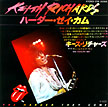 The Stones score a big fat zero in the realm of Christmas rock as a group, unless you count "Winter" from Goat's Head Soup, but this release from 1978 is Keef's first-known solo recording, apart from those few rare copies of the "Happy" single credited to him. (Note cover is from the Japanese edition.) The performance is a bit muddy, and his voice is down in the mix, but it shouldn't be surprising that he would choose to cover a tune made famous by Chuck Berry. This is the B side of the single; the A-side is a version of Jimmy Cliff's "The Harder They Come." UPDATE: Reissued on iTunes for 2007, available on Little Steven's Christmas a-Go-Go compilation.
The Stones score a big fat zero in the realm of Christmas rock as a group, unless you count "Winter" from Goat's Head Soup, but this release from 1978 is Keef's first-known solo recording, apart from those few rare copies of the "Happy" single credited to him. (Note cover is from the Japanese edition.) The performance is a bit muddy, and his voice is down in the mix, but it shouldn't be surprising that he would choose to cover a tune made famous by Chuck Berry. This is the B side of the single; the A-side is a version of Jimmy Cliff's "The Harder They Come." UPDATE: Reissued on iTunes for 2007, available on Little Steven's Christmas a-Go-Go compilation.
August 2008 Archives
 The Stones score a big fat zero in the realm of Christmas rock as a group, unless you count "Winter" from Goat's Head Soup, but this release from 1978 is Keef's first-known solo recording, apart from those few rare copies of the "Happy" single credited to him. (Note cover is from the Japanese edition.) The performance is a bit muddy, and his voice is down in the mix, but it shouldn't be surprising that he would choose to cover a tune made famous by Chuck Berry. This is the B side of the single; the A-side is a version of Jimmy Cliff's "The Harder They Come." UPDATE: Reissued on iTunes for 2007, available on Little Steven's Christmas a-Go-Go compilation.
The Stones score a big fat zero in the realm of Christmas rock as a group, unless you count "Winter" from Goat's Head Soup, but this release from 1978 is Keef's first-known solo recording, apart from those few rare copies of the "Happy" single credited to him. (Note cover is from the Japanese edition.) The performance is a bit muddy, and his voice is down in the mix, but it shouldn't be surprising that he would choose to cover a tune made famous by Chuck Berry. This is the B side of the single; the A-side is a version of Jimmy Cliff's "The Harder They Come." UPDATE: Reissued on iTunes for 2007, available on Little Steven's Christmas a-Go-Go compilation.
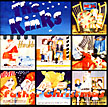 If you're looking for someone to satirize the whole idea of Christmas, Ray Davies would be high on the list of suspects to do so. This 1976 song by the Kinks does exactly that, intimating that happy holidays are a luxury for the rich and that for everyone else, it's every man for himself. Father Christmas gets mugged by a bunch of street toughs in this anti-classic. Though it bowed to little notice, this song has become a much-covered classic in recent years as well as an often-chosen addition to modern rock Christmas anthologies.
If you're looking for someone to satirize the whole idea of Christmas, Ray Davies would be high on the list of suspects to do so. This 1976 song by the Kinks does exactly that, intimating that happy holidays are a luxury for the rich and that for everyone else, it's every man for himself. Father Christmas gets mugged by a bunch of street toughs in this anti-classic. Though it bowed to little notice, this song has become a much-covered classic in recent years as well as an often-chosen addition to modern rock Christmas anthologies.
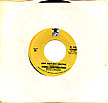 A 1977 single that nicely straddles 70s pop-rock with the rising new wave, I have to admit I don't know a darned thing about this record or its artists except that it makes a nice addition to a Christmas mix tape. Extra Brownie points go to these guys for covering "I Wish It Could Be Christmas Every Day" on the B-side. I wouldn't guarantee that this hasn't been reissued on CD somewhere, but I've yet to see it. It does show up in the $9 to $16 price range on the occasional vinyl site, though.
A 1977 single that nicely straddles 70s pop-rock with the rising new wave, I have to admit I don't know a darned thing about this record or its artists except that it makes a nice addition to a Christmas mix tape. Extra Brownie points go to these guys for covering "I Wish It Could Be Christmas Every Day" on the B-side. I wouldn't guarantee that this hasn't been reissued on CD somewhere, but I've yet to see it. It does show up in the $9 to $16 price range on the occasional vinyl site, though.
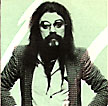 Electric Light Orchestra was formed out of the ruins of The Move by Jeff Lynne and Roy Wood, but after the first ELO album Wood decided the group was being motivated more by Lynne's orchestral Beatleisms than Wood's vision of Phil Spector meets the Count Basie Orchestra, and he left ELO to form Wizzard, initially storming the British charts with a string of brilliant singles that couldn't get a foothold in the U.S. This 1973 winner was one of those singles, a Spector cop from its wall of sound to its jingle bells, with a kids' chorus thrown in for good measure. Classic moment: just before the kids start singing, Wood yells, "OK you lot, let's hear it!" Wood revisited the genre with "Rock and Roll Winter" a few years later, with less chart success. And in 1991 he recorded "Sing Out the Old, Ring In the New," which looked to clone the success of "I Wish," right down to kids singing the chorus near the end. Then he hooked up with The Wombles for the mashup "Wombling Christmas Every Day"....
Electric Light Orchestra was formed out of the ruins of The Move by Jeff Lynne and Roy Wood, but after the first ELO album Wood decided the group was being motivated more by Lynne's orchestral Beatleisms than Wood's vision of Phil Spector meets the Count Basie Orchestra, and he left ELO to form Wizzard, initially storming the British charts with a string of brilliant singles that couldn't get a foothold in the U.S. This 1973 winner was one of those singles, a Spector cop from its wall of sound to its jingle bells, with a kids' chorus thrown in for good measure. Classic moment: just before the kids start singing, Wood yells, "OK you lot, let's hear it!" Wood revisited the genre with "Rock and Roll Winter" a few years later, with less chart success. And in 1991 he recorded "Sing Out the Old, Ring In the New," which looked to clone the success of "I Wish," right down to kids singing the chorus near the end. Then he hooked up with The Wombles for the mashup "Wombling Christmas Every Day"....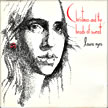 You really have to be in the right mood for this tune, taken from Laura's classic 1971 LP Christmas and the Beads of Sweat. It's long, about seven minutes, and it takes a while to get to the point, plus the loud-soft dynamics are rather abrupt. She starts out solo, with lengthy pauses between verses and piano chords, finally getting into a slow soul-gospel groove near the end. Verses referring to "Black Panther brothers," "Chicago Seven" and "homeless Indians" are pretty dated nowadays, but other lines like "Madonnas weep for wars of hell, they blow out the candles and haunt Noel" or "The sins of politics, the politics of sin" still resonate.
You really have to be in the right mood for this tune, taken from Laura's classic 1971 LP Christmas and the Beads of Sweat. It's long, about seven minutes, and it takes a while to get to the point, plus the loud-soft dynamics are rather abrupt. She starts out solo, with lengthy pauses between verses and piano chords, finally getting into a slow soul-gospel groove near the end. Verses referring to "Black Panther brothers," "Chicago Seven" and "homeless Indians" are pretty dated nowadays, but other lines like "Madonnas weep for wars of hell, they blow out the candles and haunt Noel" or "The sins of politics, the politics of sin" still resonate.
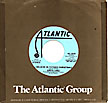 Years after progressive rock went out of style, there are darned few tunes from that period you can walk down the street and hum or whistle without causing passersby to reach for the butterfly net. This tune from the Lake in Emerson, Lake and Palmer is an exception. The original 1975 version of this song was a stately yet sentimental ode to Christmas, and it sounds like Keith Emerson had a hand in the arrangement. A subsequent re-recording of this song by the whole band also is available; the arrangements are similar but the newer version features less orchestral instrumentation in favor of choral backing vocals on the later verses. There's a third version of it on the 2002 CD A Classic Rock Christmas. Composed by Lake and his preferred co-writer of the time, Pete Sinfield, both of the original King Crimson, they also co-wrote the instrumental flip side, "Humbug." By the way, with "The Nutcracker" being a favorite Christmastime entertainment, we should also call attention to ELP's cover, on the Pictures at an Exhibition album, of B. Bumble and the Stingers' "Nutrocker" as a Christmas tune. There's also an ELP Christmas CD single from 1995 that combines these songs with a couple of others, but it appears to be out of print.
Years after progressive rock went out of style, there are darned few tunes from that period you can walk down the street and hum or whistle without causing passersby to reach for the butterfly net. This tune from the Lake in Emerson, Lake and Palmer is an exception. The original 1975 version of this song was a stately yet sentimental ode to Christmas, and it sounds like Keith Emerson had a hand in the arrangement. A subsequent re-recording of this song by the whole band also is available; the arrangements are similar but the newer version features less orchestral instrumentation in favor of choral backing vocals on the later verses. There's a third version of it on the 2002 CD A Classic Rock Christmas. Composed by Lake and his preferred co-writer of the time, Pete Sinfield, both of the original King Crimson, they also co-wrote the instrumental flip side, "Humbug." By the way, with "The Nutcracker" being a favorite Christmastime entertainment, we should also call attention to ELP's cover, on the Pictures at an Exhibition album, of B. Bumble and the Stingers' "Nutrocker" as a Christmas tune. There's also an ELP Christmas CD single from 1995 that combines these songs with a couple of others, but it appears to be out of print.
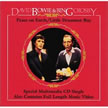 The very fact that Bing and Bowie sang a duet at any time for any reason was a real thigh-slapper in 1977, which is why this performance from Bing's last Christmas special was widely bootlegged for about five years before RCA finally said "the hell with it" and put it out. It's a nice record, too, combining the best aspects of both singers in a performance that is emotional but not at all overwrought or sappy. It's a little difficult to shake loose a copy lately, as the CD single pictured here is out of print, as are nearly all the various compilations that have featured the song over the years.
The very fact that Bing and Bowie sang a duet at any time for any reason was a real thigh-slapper in 1977, which is why this performance from Bing's last Christmas special was widely bootlegged for about five years before RCA finally said "the hell with it" and put it out. It's a nice record, too, combining the best aspects of both singers in a performance that is emotional but not at all overwrought or sappy. It's a little difficult to shake loose a copy lately, as the CD single pictured here is out of print, as are nearly all the various compilations that have featured the song over the years.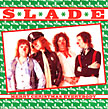 Continuing with the British holiday invasion of the 1970s is this tune from Slade, written by band members Holder-Lea and produced by Chas Chandler, he who discovered Jimi Hendrix. It's a typical example of the band's early 70s string of Top 40 hits, none of which made much headway on the American charts, although Anglophiles in such enclaves as Cleveland and Los Angeles managed to give the band enough of a U.S. reputation to carry them into a minor comeback in the mid-80s. The style is a kind of singsongy guitar-pop that's good for drunken singalongs. UPDATE: Slade's also on record with "Santa Claus Is Coming To Town" and "Here's to the New Year."
Continuing with the British holiday invasion of the 1970s is this tune from Slade, written by band members Holder-Lea and produced by Chas Chandler, he who discovered Jimi Hendrix. It's a typical example of the band's early 70s string of Top 40 hits, none of which made much headway on the American charts, although Anglophiles in such enclaves as Cleveland and Los Angeles managed to give the band enough of a U.S. reputation to carry them into a minor comeback in the mid-80s. The style is a kind of singsongy guitar-pop that's good for drunken singalongs. UPDATE: Slade's also on record with "Santa Claus Is Coming To Town" and "Here's to the New Year."
 There seems to have been a rush to do Christmas songs for the holiday among British artists in the early 70s, with Wizzard, Slade, Greg Lake, Elton John and others all bringing out their own original takes on the holiday in that time period. Of course, Christmas music fans don't need to be reminded that the Brits are constantly on the watch to predict which song will be no. 1 on Christmas Day, as humorously depicted in the film "Love Actually." Elton's 1973 single is an underrated gem that is more likely to be heard (and seen) on VH1 at holiday time than the radio. For extra credit, the flip side is "Ho Ho Ho (Who'd Be a Turkey at Christmas)." This turns up on a number of compilations, including Elton John's Christmas Party, where he also is joined on a duet of "Calling It Christmas" with Joss Stone.
There seems to have been a rush to do Christmas songs for the holiday among British artists in the early 70s, with Wizzard, Slade, Greg Lake, Elton John and others all bringing out their own original takes on the holiday in that time period. Of course, Christmas music fans don't need to be reminded that the Brits are constantly on the watch to predict which song will be no. 1 on Christmas Day, as humorously depicted in the film "Love Actually." Elton's 1973 single is an underrated gem that is more likely to be heard (and seen) on VH1 at holiday time than the radio. For extra credit, the flip side is "Ho Ho Ho (Who'd Be a Turkey at Christmas)." This turns up on a number of compilations, including Elton John's Christmas Party, where he also is joined on a duet of "Calling It Christmas" with Joss Stone.
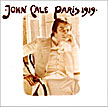 From the composer's Paris 1919 album of 1973, the liner notes tell nothing of this album's history, but I seem to recall this being part of the Velvet Underground co-founder's foray into California music with folks like Lowell George. The song in question is actually pretty obscure as to any relationship with the title, but if you listen closely, you can put it all together.
From the composer's Paris 1919 album of 1973, the liner notes tell nothing of this album's history, but I seem to recall this being part of the Velvet Underground co-founder's foray into California music with folks like Lowell George. The song in question is actually pretty obscure as to any relationship with the title, but if you listen closely, you can put it all together.
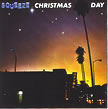 Released as a single only in England in 1979, it has that Difford/Tilbrook way of looking at the world, complete with Morecambe and Wise reference in the chorus. Kicking off with Jools Holland on portentious piano chords, it proceeds through a number of "movements" from churchy to poppy over its four minutes, a trademark Squeeze approach. Later offered on the IRS Christmas CD and Rhino's Just Can't Get Enough: New Wave Christmas.
Released as a single only in England in 1979, it has that Difford/Tilbrook way of looking at the world, complete with Morecambe and Wise reference in the chorus. Kicking off with Jools Holland on portentious piano chords, it proceeds through a number of "movements" from churchy to poppy over its four minutes, a trademark Squeeze approach. Later offered on the IRS Christmas CD and Rhino's Just Can't Get Enough: New Wave Christmas.
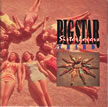 Ardent was the pop-rock imprint of Stax Records, and Big Star is one of those bands who, like the Velvet Underground, didn't sell many records in their heyday except to people who went on to form their own bands, as the old joke goes. Led by Alex Chilton of Box Tops fame ("The Letter"), the group came to be one of the pioneers of "power pop" back before anybody knew there was such a thing. This Christmas tune is from their 1975 third album Sister Lovers, a record that never saw a release during the band's original existence and was pieced together under several different titles until Rykodisc finally got Chilton and producer Jim Dickinson to assemble an approved version in 1992. The song has turned up on a few compilations along the way as well. It's a short, shambling pop-rocker that patches together a handful of Christmas sentiments pinched from other carols. Given its humble ingredients, it still manages a kind of majesty that inspires occasional covers.
Ardent was the pop-rock imprint of Stax Records, and Big Star is one of those bands who, like the Velvet Underground, didn't sell many records in their heyday except to people who went on to form their own bands, as the old joke goes. Led by Alex Chilton of Box Tops fame ("The Letter"), the group came to be one of the pioneers of "power pop" back before anybody knew there was such a thing. This Christmas tune is from their 1975 third album Sister Lovers, a record that never saw a release during the band's original existence and was pieced together under several different titles until Rykodisc finally got Chilton and producer Jim Dickinson to assemble an approved version in 1992. The song has turned up on a few compilations along the way as well. It's a short, shambling pop-rocker that patches together a handful of Christmas sentiments pinched from other carols. Given its humble ingredients, it still manages a kind of majesty that inspires occasional covers.
 Sir Paul apparently had just gotten himself a Polymoog and had some studio time laying around, so he threw this together for the season in 1979. It's slapdash and could have been a tad shorter, but other than that it's just fine, even if that is Linda on background vocals. (Linda was a great human being in so many ways, just not much of a singer.) It probably suffers in comparison to John Lennon's "Happy Xmas," but then many Christmas records do, don't they? Nevertheless, the song has notched its fair share of covers over the years as well. The B-side, "Rudolph the Red-Nosed Reggae," is even more slapdash, but then Paul doesn't often get credit for having a sense of humor. UPDATE: The single sleeve links you to one of those Now That's What I Call Christmas discs, since Paul is in the process of taking all of his solo works away from EMI and over to Hear Music, the Starbucks label. There is a reissue of the original single on red vinyl knocking around out there, though it's out of print as well.
Sir Paul apparently had just gotten himself a Polymoog and had some studio time laying around, so he threw this together for the season in 1979. It's slapdash and could have been a tad shorter, but other than that it's just fine, even if that is Linda on background vocals. (Linda was a great human being in so many ways, just not much of a singer.) It probably suffers in comparison to John Lennon's "Happy Xmas," but then many Christmas records do, don't they? Nevertheless, the song has notched its fair share of covers over the years as well. The B-side, "Rudolph the Red-Nosed Reggae," is even more slapdash, but then Paul doesn't often get credit for having a sense of humor. UPDATE: The single sleeve links you to one of those Now That's What I Call Christmas discs, since Paul is in the process of taking all of his solo works away from EMI and over to Hear Music, the Starbucks label. There is a reissue of the original single on red vinyl knocking around out there, though it's out of print as well.
 The most enduring result of John Lennon and Yoko Ono's public campaign for peace in the late 60s and early 70s is this classic 1971 single, originally released on clear green vinyl. Envisioned as peace propaganda by its creators, the record has taken on a life of its own as a Christmas staple. The fact that Phil Spector was co-producer may have had something to do with its success; in the Spector biography Out of His Head, there's a reference to Spector's coming in on a rehearsal of the song. Appalled by the skeletal backing group Lennon had assembled, he yelled, "Get me five acoustic guitarists. And if this is a Christmas record, we need bells...." Needless to say, covers of this iconic song are almost mandatory among those rockers who deign to make holiday discs.
The most enduring result of John Lennon and Yoko Ono's public campaign for peace in the late 60s and early 70s is this classic 1971 single, originally released on clear green vinyl. Envisioned as peace propaganda by its creators, the record has taken on a life of its own as a Christmas staple. The fact that Phil Spector was co-producer may have had something to do with its success; in the Spector biography Out of His Head, there's a reference to Spector's coming in on a rehearsal of the song. Appalled by the skeletal backing group Lennon had assembled, he yelled, "Get me five acoustic guitarists. And if this is a Christmas record, we need bells...." Needless to say, covers of this iconic song are almost mandatory among those rockers who deign to make holiday discs.
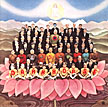 An almost-forgotten single by Harrison from his Dark Horse album of 1974, it brings his characteristic solo sound to a New Year's flavored tune. Lyrically it's no great shakes, but it serves the purpose, and the combination of George's trademark slide guitar with church bell chimes still sounds unique years later.
An almost-forgotten single by Harrison from his Dark Horse album of 1974, it brings his characteristic solo sound to a New Year's flavored tune. Lyrically it's no great shakes, but it serves the purpose, and the combination of George's trademark slide guitar with church bell chimes still sounds unique years later.
 From the landmark album Blue in 1971, this song brought the contemporary (to that year) singer-songwriter viewpoint to Christmas music. The downtempo lost-love lyric is never sappy and the lack of a happy ending remains rare among pop-rock Christmas songs. Listening to this record probably stops a lot of less-talented writers from doing their own original Christmas songs. It's so good the writers of "Ally McBeal" were able to hang an entire episode on it, complete with a rendition of the song by Robert Downey Jr.
From the landmark album Blue in 1971, this song brought the contemporary (to that year) singer-songwriter viewpoint to Christmas music. The downtempo lost-love lyric is never sappy and the lack of a happy ending remains rare among pop-rock Christmas songs. Listening to this record probably stops a lot of less-talented writers from doing their own original Christmas songs. It's so good the writers of "Ally McBeal" were able to hang an entire episode on it, complete with a rendition of the song by Robert Downey Jr.
